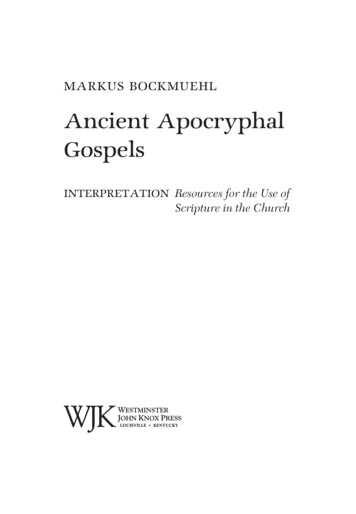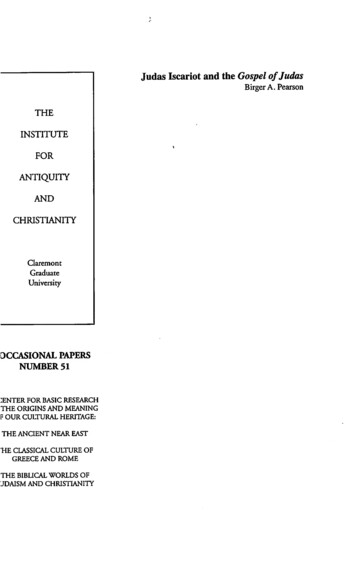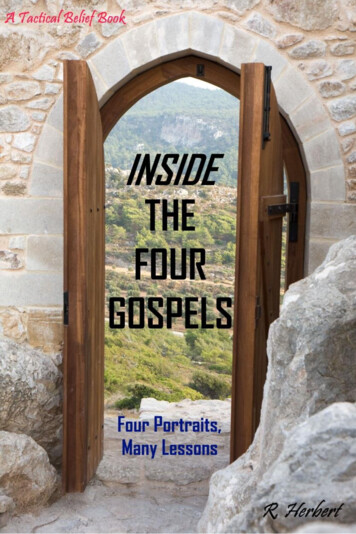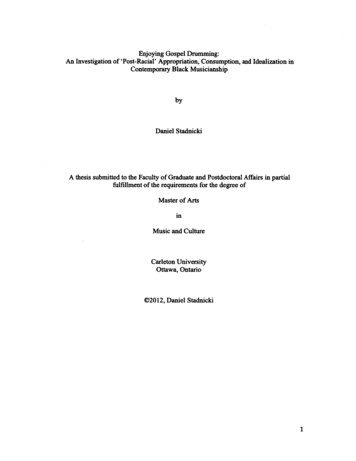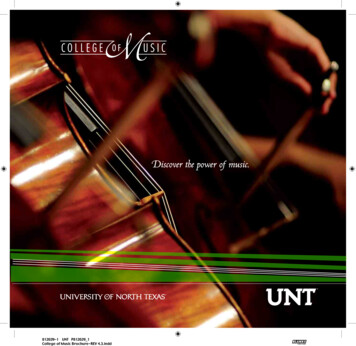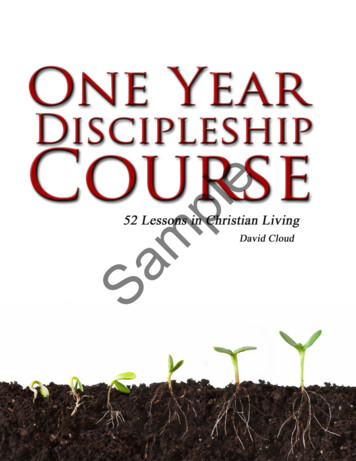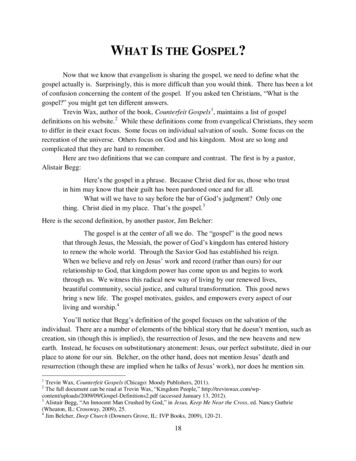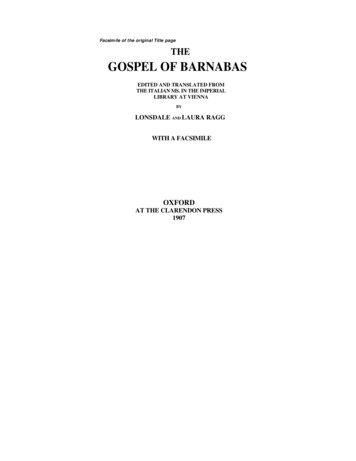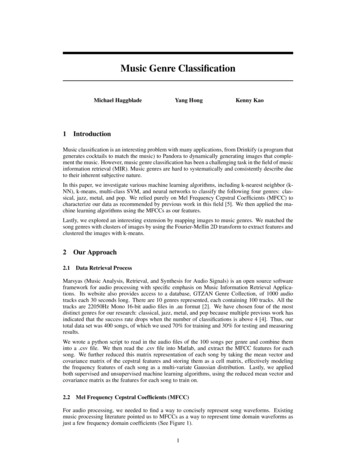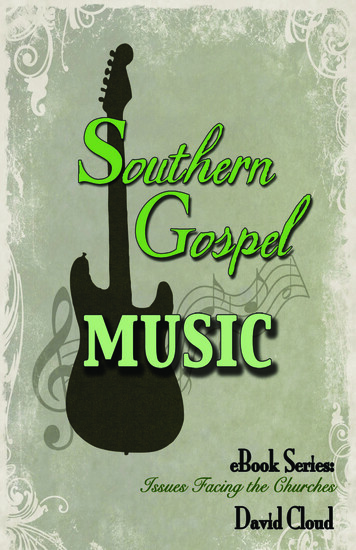
Transcription
Southern Gospel MusicCopyright 1998 by David W. CloudThis edition May 6, 2014ISBN 978-1-58318-148-5This book is sold in print format but it is available for freedistribution in eBook format--in pdf, mobi (for Kindle, etc.), andePub. See the Free Book tab - www.wayoflife.org. We do not allowdistribution of this book from other web sites.Published by Way of Life LiteraturePO Box 610368, Port Huron, MI 48061866-295-4143 (toll free) - fbns@wayoflife.orgwww.wayoflife.orgCanada: Bethel Baptist Church4212 Campbell St. N., London Ont. N6P 1A6519-652-2619Printed in Canada byBethel Baptist Print Ministryii
Table of ContentsIntroduction.1History of Southern Gospel .3Worldliness .10Southern Gospel in Recent Years.19Southern Gospel and CCM .24When to Avoid Southern Gospel Music .25About Way of Life’s eBooks .30Powerful Publications for These Times.31iii
iv
IntroductionSouthern gospel is not a single style of music. It is aclassification of a broad range of harmonizing, countrytinged Christian music that originated in the southeasternpart of the United States.Some Southern gospel is lovely and spiritual and seeks notto entertain the flesh but to edify the spirit. (There are alsoquartets that are not Southern gospel in style; an example isthe Old Fashioned Revival Hour Quartet that was featured onCharles Fuller’s radio program.) We praise the Lord for allChristian music, Southern or otherwise, which doesn’t soundlike the world, which has scriptural lyrics, which seeks solelyto glorify Jesus Christ and edify the saints, and which isproduced by faithful Christians. Sadly, though, much of theSouthern gospel incorporates worldly pop, country, ragtime,jazz, boogie-woogie, and rock rhythms, and is orientedtoward entertainment. It is the latter that is closely akin toContemporary Christian Music. As a matter of fact,commercial Southern gospel today is one of the branches ofthe larger CCM world.I grew up with Southern gospel. The Southern Baptistchurches my mom and dad attended in Florida would haveafternoon sings on some Sundays. Following the morningservice, we would have a glorious “dinner on the ground,”featuring tables piled high with the tastiest dishes the churchladies could concoct. The kids would romp around as thetables were prepared, then the pastor would pray andeveryone would gorge himself on whichever foods suitedtheir fancy. The variety was incredible. When the meal wasfinished and the tables cleared, everyone gathered back in thechurch auditorium for the sing. There would be somecongregational singing and then the quartets would start up.Usually these were local groups, but sometimes a professional1
group would be available. I always liked the congregationalsinging best.2
History of Southern GospelAs we will see, Southern gospel brought four significantchanges to Christian music in North America in the 1920s,‘30s, ‘40s and ‘50s. (1) They commercialized it. (2) They tookit out of the churches and put it into hands of publishers andpromoters. (3) They jazzed it up with worldly styles. (4) Theyturned it into entertainment. Gospel music publisher Harperand Associates advertised their Southern gospel music as“Family entertainment with a message, entertainment that aFair or civic organization can sponsor and not feel like they’regetting too churchy.” This sounds exactly like theContemporary Christian Music approach. The StampsQuartet of the 1930s “not only sang the most popular gospelsongs of the day, but gave an all-around entertainmentprogram” (Bob Terrell, The Music Men, p. 39).Professional Southern gospel quartets were born in theearly part of this century as business enterprises. Prior to thatquartets were mixed (men and women) and “sang in theirchurches simply for the spiritual edification of thecongregation” (The Music Men, p. 54). The inventor of theprofessional male gospel quartet was a Nazarene, JamesVaughan, who hired a quartet in 1910 to represent his musicpublishing company (which he had founded in 1902). TheVaughan Quartet performances at churches, revivals, andconventions were a means whereby Vaughan sold music. “Inthis way the groups promoted their sponsor and created amarket for the songbooks” (David L. Taylor, Happy Rhythm,p. 7). By the late 1920s Vaughan had 16 full-time quartets onthe road. In 1921 the pioneering Vaughan cut the first recordfor his new recording company, and in 1922 he built the firstradio station in Tennessee, all with the goal of promoting hismusic. In 1924 the V.O. Stamps Music Company was foundedby a Baptist, Virgil Stamps; and he, too, put quartets to work.In 1929 this company became the famous Stamps-Baxter3
Music Company. These companies established influentialmusic training schools and created the hugely popular all-dayand all-night gospel music sings.The new “Southern gospel” style featured “tag lines inaccompanying voices, chromatic lower-neighbor note andpassing notes, and in the refrain a walking bass lead withseveral interjections. The harmony was simple and veryrhythmic. A ragtime style was added later to the pianoaccompaniment (commonly called the ‘stomp beat’), whichmade the sacred and the secular indistinguishable” (H.T.Spence, Confronting Contemporary Christian Music, p. 120).The pioneer of the ragtime gospel piano style was DwightBrock, who played in one of the Stamps quartets.“Brock played a rhythm piano style; some thought it soundeda little like Dixieland [jazz] or razzamatazz. . Thousands ofpianists would copy his style in the years to come. . IT WASREVOLUTIONARY BECAUSE IT JAZZED UP GOSPELMUSIC JUST ENOUGH FOR THE SECULAR PUBLIC TOCATCH ON. Dwight’s nephew, Brock Speer, who sings bassfor the Speer Family today, said when his uncle was a boy inthe early teens--he was born in 1905--he heard a circusdrummer playing syncopated rhythms on snare drums, andsaid to himself, ‘I wonder if I could do that on thepiano?’“ (The Music Men, pp. 38, 39).Though the seeds for these things were present in the 1920sand ‘30s, it was not until the 1940s that Southern gospelbegan to promote an entertainment-oriented, jazzed upapproach to Christian music on a large scale. Before that thequartets were not very flashy. For example, W.B. Walbert, themanager of the Vaughan Quartet during the 1920s, “was aspiritual man who did not believe that a quartet should doanything showy to detract from the gospel messages in thesongs” (The Music Men, p. 33). This attitude did not prevail,though, and even Walbert’s own son, James, began playingthe piano backwards, playing with his elbows, and otherwiseputting on a show to entertain the crowds.4
Two of the most influential groups in this direction werethe Blackwood Brothers and the Statesmen. Prior to this,professional gospel quartets commonly sang without musicalaccompaniment or with traditional strings. The RangerQuartet, for example, often sang with a guitar. The Statesmenwere one of the first professional quartets to feature thepiano; and it was not just ANY piano, it was Hovie Lister’sragtime, honky-tonk piano. Sadly, this style has dominatedpopular Southern gospel ever since. (This does not mean, ofcourse, that the Statesmen sang ONLY jazzy music. Some oftheir numbers were nice renditions of good Christian music.An example was the beautiful “What a Savior,” featuring lyrictenor Rosie Rozell.)The following brief history of Southern gospel is by a manwho researches rock music. He has correctly observed theclose connection between jived up Southern gospel of the1940s and ‘50s and early rock & roll.“The white gospel quartets of the 1950s, when [Elvis]Presley started to study them, were every bit as exciting astheir black counterparts, USING SHOW-BIZ HYPE,WHIPPING UP CROWDS AND CREATING STARS.Reporting on an all-night sing in Atlanta, Georgia, for TheSaturday Evening Post (June 1956), Furman Bishercompared the audience response to the Oak Ridge Quartetto bobby soxers’ swooning for Frank Sinatra. ‘Women outthere shrieked, and a couple of young girls rushed to thestage edge to snap pictures of the tenor who was holdingthat high note the way a trumpet player prolongs a “ride,”’wrote Bisher. .“Presley idolized such gospel stars for the rest of his life.His particular favorites were J.D. Sumner, the tall, stringybass vocalist with the Blackwood Brothers, who also wentto the First Assembly of God Church in Memphis, andJake Hess and Hovie Lister of the Statesmen Quartet(which actually had five members). An ordained minister,LISTER IS OFTEN CREDITED WITH BRINGING5
SHOW BUSINESS TO QUARTET SINGING. At the timehe said, ‘If it takes shaking my hair down, beating a pianolike Liberace or Piano Red to keep these young people outof beer joints and the rear seats of cars, I’ll do it. TheDevil’s got his kind of entertainment. We’ve got ours. Theycriticize me, say I’m too lively for religion, but I get results.That’s what counts’“ (emphasis added) (Steve Turner,Hungry for Heaven, pp. 29-31).Lister’s philosophy was pragmatism; whatever works isright. This is exactly the same New Evangelical philosophythat permeates the Contemporary Christian Music fieldtoday. Hovie Lister and the Statesmen were forerunners toCCM. God has not instructed us to do whatever “gets results,”but to obey His Word regardless of the results. The soleauthority for faith and practice is the Bible. If it is Scriptural itis right; if it is not Scriptural, it is wrong, regardless of howwell it appears to work. God’s Word plainly forbids Hispeople to love the world. It is therefore impossible to pleaseGod by adapting the things of the world to the service ofChrist. Liberace was a homosexual entertainer who helpedcorrupt the morals of America. I believe it is a serious errorto adopt his sensual, worldly ways to Gospel music. Wheredoes God’s Word encourage us to copy the world? To be holy,means to be set apart from and different from the world.Nowhere do we see the Lord Jesus Christ or the Apostlesentertaining people in the name of the ministry. We do notsee them putting on some sort of worldly show to draw acrowd. We do not see them adapting themselves to the spiritof the age. We do not see them attempting to manipulatepeople by worldly means. The Apostle Paul plainly stated thathe depended solely upon the power of the Holy Spirit. “For Idetermined not to know any thing among you, save JesusChrist, and him crucified. And I was with you in weakness,and in fear, and in much trembling. And my speech and mypreaching was not with enticing words of man’s wisdom, butin demonstration of the Spirit and of power: That your faith6
should not stand in the wisdom of men, but in the power ofGod” (1 Corinthians 2:2-5).Now we continue with Steve Turner’s overview of thehistory of Southern gospel:“White quartet singing had developed in the 1920s . theybegan to develop showmanship and gimmicks during the1940s. . Hovie Lister, a dashing young man with long,dark wavy hair and an Errol Flynn mustache, LOVED TOSHAKE IT ALL UP FOR THE LORD. He joined withCrumpler and Jake Hess to form the Statesmen Quartet,which was to become one of the first supergroups of whitegospel, catapulting the music to commercial acceptabilityand SETTING THE STYLE FOR EMERGENT ROCK ‘N’ROLLERS BRED ON HOLY MUSIC.“Although much was made of the evils of dancing, showbusiness, jukeboxes and television, THE SUCCESS OFTHE GOSPEL QUARTETS WAS LARGELY DUE TOTHEIR PRESENTING MUCH OF THE SAME GLOSSAND EXCITEMENT in an acceptable context. The songswere about loving your neighbor, being holy and notgiving in to ‘modern religion,’ but THE PERFORMANCESDREW FROM POP, BLUES, COUNTRY, RAGTIME ANDJAZZ. .“Don Butler, now director of archives for the Nashvillebased Gospel Music Association, was the StatesmenQuartet’s manager during the 1950s. ‘They weresensational,’ he remembers. ‘Hovie Lister had no peer inshowmanship. He created a tremendous rapport with theaudience. HE COULD TURN THEIR EMOTIONS ONAND OFF JUST LIKE THAT. They also had highlypolished harmonies and arrangements. HOVIE WOULDJUMP ONTO A PIANO AND SHAKE HIS LONGBLACK HAIR INTO HIS FACE WHILE THE REST OFTHE GROUP DANCED ON STAGE. They were the firstquartet to use four individual microphones. Before thateveryone had gathered around one mike’“ (emphasisadded) (Steve Turner, Hungry for Heaven, pp. 29-31).7
Bill Gaither, in his history of Southern gospel, admits thatHovie Lister’s “approach was loud, fast, swingy, and pop” andthat “he would do whatever it took to get the loudestapplause, the biggest laugh” (Bill Gaither, Homecoming, p.133). In fact, some conservative Christian radio stationsbroke Statesmen records on the air to protest their jazzymusic.The Statesmen’s bass singer, Jim “Big Chief ” Wetherington,moved his legs in ways strangely reminiscent of how Elvismoved to rock & roll. Jake Hess, another member of theoriginal Statesmen, noted: “He went about as far as you couldgo in gospel music. The women would jump up, just like theydo for pop shows” (Peter Guralnick, Last Train for Memphis,p. 48). Rock historian Peter Guralnick observes that“preachers frequently objected to the lewd movements.”Some of the Statesmen Quartet’s music was brought overfrom the swinging black gospel. “So many of their early hitsbegan to stray away some from the southern, singingconvention style—the music that was coming out of StampsBaxter—and basically were coming out of the blacktradition” (Taylor, Happy Rhythms, p. 32).Describing the popular Southern gospel quartets of the1940s and 1950s, Wally Varner of the Melody Masterstestifies: “I guess the Melody Masters were one of the wildestorganizations, for the lack of a better word, that I’ve everworked with. I used to turn flips and things like that. . Inthose days GOSPEL MUSIC WASN’T AS SPIRITUAL, ITWAS MORE ENTERTAINING. We had a rambunctious typeof program, but we also had some beautiful singing that wewould settle down to” (Taylor, Happy Rhythms, p. 22).Another popular group, The Delmore Brothers, “mixedsacred lyrics, blues and boogie with spectacular commercialresults” (David Seay, Stairway to Heaven, p. 49).Southern gospel in the 1970s was still entertainmentoriented and highly competitive. “All-night sings occasionallyresembled singing contests, as groups often appeared more8
interested in ‘putting it to’ one another onstage thanentertaining and ministering to the audience” (Ibid., p. 111).9
WorldlinessThere have been two distinct sides or camps to Southerngospel. We would label them conservative and contemporary.The conservative Southern gospel people have used musicsolely to glorify Jesus Christ and edify the saints. They haverefused to jazz up the music with worldly rhythms andsounds. The singers and musicians who represent thiscategory have tended to live godly, Christ-honoring lives. Thecontemporary side has used music for entertainment. Theyhave sought to jazz up Christian music with the world’srhythms. The singers and musicians in this category havetended to live spiritually careless, worldly lives.This distinction has been evident from the inception ofSouthern gospel. Even in the 1920s, ‘30s, and ‘40s, there weremany churches which refused to participate in the “jazzy”side of Southern gospel and which refused to allow worldlySouthern gospel musicians to ply their wares. One of thereasons why so many of the popular Southern gospel groupsof that era sang in school auditoriums and other secularvenues was because “some churches would not permit these‘jazzy’ singers to perform in church houses” (The Music Men,pp. 64, 65).The two different camps within Southern gospel werealready evident in the 1920s. James Vaughan did have acommercial goal with his music, but his chief goal was thespiritual edification of his hearers and he did not introduceworldliness into the music. He “emphasized holiness andliving a sanctified life, separated from the world” and hisgroups “avoided any style that would draw attention tooneself ” (Homecoming, p. 76). Vaughn lived an exemplaryChristian life and “never used tobacco in any form, neverswore an oath, and never drank intoxicating beverages” (TheMusic Men, p. 28). He “knew the Bible as few men did.” V.O.Stamps, on the other hand, exemplified the worldly camp.10
Stamps was a heavy smoker and a glutton who died young ofdiabetes. He would order two-pound steaks and follow thatup with three pieces of pie. At one of his All-Night Broadcastshe drank 46 sodas, most of them Coca-Colas (The MusicMen, p. 122). This camp within Southern gospel was far lesscareful about spiritual matters and had no conviction aboutputting on a show with their music. The Stamps Quartet evenin the early years was described as “an entertainingfivesome” (The Music Men, p. 39). Their theme song was“Give the World a Smile,” which featured strong rhythm withthe bass singing melody and the upper voices singing anafterbeat. “Then, on the repeat chorus, they sang a boom,boo, pang, pang effect like a rhythm guitar” (Ibid.). Theirragtime pianist was the aforementioned Dwight Brock, who“jazzed up gospel music just enough for the secular public tocatch on.”Many of the popular Southern gospel groups of the 1950sand ‘60s were characterized by worldliness. Drinking,smoking, womanizing, and divorce has been a commonfeature of Southern gospel. The Statesmen’s first tenor, BobbyStrickland observed that Southern gospel quartets often reacha certain level and “then something happens.” He believed thereason for this was that “they don’t live right” (The MusicMen, p. 97).The Sunshine Boys were formed by Ace Richman, a swingband entertainer who saw that gospel quartets werefinancially profitable. When he added “Western swing” togospel songs, he saw that “people liked them evenbetter” (The Music Men, p. 190). Richman was “the man whoput swing into gospel.” The Sunshine Boys were pureentertainment. They did not testify of Christ or giveinvitations. Richman told preachers, “We do not testify; weare an entertaining group. You pay us to sing these songs, andwe’ll sing ‘em. But that’s all.”J.D. Sumner and the Sunshine Boys were infamous for theirworldly lifestyles. They smoked, drank, cavorted with11
women, etc. “The Blackwoods, three months before their airtragedy, were not the only ones who referred to him[Sumner] and his cohorts in the Sunshine Boys asinfidels” (Gaither, Homecoming, p. 160). J.D. Sumner almostlost his marriage because of his moral recklessness. He wenton to sing bass with the famous Blackwood Brothers, thenwith the Stamps Quartet.J.D. Sumner and the Stamps and other Southern gospelgroups performed with Elvis Presley in his sleazy rockconcerts at Las Vegas and elsewhere. (During the years inwhich Sumner and the Stamps were backing Elvis, Sumner’snephew, Donnie, who sang in the group, became a drugaddict and was lured into the licentious pop music field.) EdHill, one of the singers with the Stamps, was Elvis’ announcerfor two years. It was Hill who concluded the Elvis concertswith: “Ladies and gentlemen, Elvis has left the building.Goodbye, and God bless you.” After Elvis’ death, J.D. Sumnerand the Stamps performed rock concerts in tribute to ElvisPresley.The Jordanaires performed as background singers on ElvisPresley records and as session singers for many other raunchyrock and country recordings. The Jordanaires provided vocalsfor Elvis’ 1956 megahit “Hound Dog.” The Jordanaires touredwith Eddy Arnold as well as with Elvis. They also performedon some of Elvis’ indecent movies.Members of the Speer Family (Ben and Brock) also sang onElvis recordings, including “I’ve Got a Woman” and“Heartbreak Hotel.”Laverne Tripp, who sang with the Sierra Quartet and theBlue Ridge Quartet, was well known for his carnality.The piano player with the Sierra Quartet was a knownhomosexual.At one Kingsmen Quartet concert a screaming, hair-pullingfight broke out between the bass singer’s ex-wife and hiscurrent girlfriend.12
The September 2002 edition of Singing News, which coversSouthern Gospel Music, contains a full page promoting DollyParton’s Dollywood entertainment center in Tennessee.Dollywood hosts a 30-day Southern Gospel Jubilee each year.Dolly Parton, who dresses very immodestly and iscomfortable in the midst of the moral filth of Hollywood,starred in the filthy R-rated movie “The Best LittleWhorehouse in Texas.”These sad facts could be multiplied. Someone might protestthat I am blackening the entire Southern gospel music fieldwith a relatively few worldly musicians, but that is not thecase. First of all, I know and have testified that there are manygodly people who sing Southern gospel. There is anotherpoint that needs to be made, though, and that is the fact thatSouthern gospel music as an institution does not rebuke theworldliness of musicians and, in fact, honors worldly people.In spite of J.D. Sumner’s worldliness, for example, he has beenhighly exalted in the Southern gospel music field. Sumnerdied in 1998, and the Southern Gospel Museum and Hall ofFame was built partly in his honor. He was mentionedfrequently and honorably at the National Quartet Conventionthat I attended with press credentials in September 1999.There was no warning about how he exalted wicked ElvisPresley and performed rock music.We believe the worldly living produced the worldly music.Carnality produces spiritual blindness and powerlessness (1Pet. 2:11; 1 Cor. 3:1-2; Heb. 5:12-14; Rev. 3:16-17).“Many Christians see some things, but because their heartsare still in a carnal state (in a sympathy for the world),their sight is distorted. . A Christian, even if he isfaithfully working in the vineyard for Christ, can possiblyhave a lukewarm life. According to Revelation 3:17,lukewarmness in a Christian’s life (and it does not matter ifhe is a leader in the church or not) produces blindness.Some men who have been viewed as the authorities ofmusic, who have led in the forefront years ago in the13
Christian circles, are now compromising the principles ofGod’s word with their music. Dear reader, it is an evidenceof either lukewarmness or backsliding. Their music hasbecome eclectic and dialectic with sounds of this age” (Dr.H.T. Spence, Confronting Contemporary Christian Music,1997, p. 8).Dr. H.T. Spence, vice president of Foundations BibleCollege & Seminary, is a fundamentalist historian andteacher who has taught music, history, and theology for 25years. He received part of his music training at Bob JonesUniversity. In the late 1960s he sang with a gospel trio calledThe Seminaries. At the time he was a Pentecostal and wassinging in Pentecostal churches. In his book on CCM henotes that popular Southern gospel quartets were singing inthe same churches, and on three occasions his trio appearedwith Laverne Tripp and the Sierra Quartet. He describes howTripp attempted “to influence our young trio to change itsstyle” by dressing in a contemporary manner and by adoptingan entertaining stage presence. They refused to heed Tripp’scounsel and on the third occasion they walked out of theprogram. The following is Dr. Spence’s testimony:“I was born in a Pentecostal home in October 1948 at atime when my grandfather was bishop of the PentecostalHoliness Church. . I received a call from God for theministry in my college freshman year (1966), and waschosen to sing in a male trio called The Seminaries; wetraveled and ministered to churches on the weekends,representing the seminary I was attending at that time.Although the Pentecostal music was not the best evenfrom the beginning, there were definite changes coming bythe late 1960s. . During the two years I was part of thegroup, we came in contact with the Southern gospelquartets who were making their appearance in thePentecostal churches. At times, we were appointed to singin the same services. One gospel music personality Iremember was Laverne Tripp, who then had a reputationfor his vacillation to backsliding, including his drinking,14
yet AN ABILITY TO SWAY A CROWD OF PEOPLEWITH HIS CRYING AND COUNTRY-SOUNDSINGING. He was with the Sierra Quartet at that time(whose piano player was a known homosexual). He triedto influence our young trio to change its style, but his flairof clothing and aggressive presence on ‘stage’ was truly toomuch for us. During a third mutual service with him, weas a trio walked out. The Pastor met us out at the parkinglot and inquired of our action. We told him in a mosthonorable way that we could not share the service withsuch a man as Mr. Tripp. The Pastor agreed with ourappraisal of him, but he said, ‘IT DRAWS THE CROWD.’With that remark, we left. Eventually, sad to state, ourpiano player married one of the sisters of Laverne and wassucked into the vortex of ‘Southern Gospel Music.’ Mr.Tripp went on to become lead singer for The Blue RidgeQuartet when Elmo Fagg left the group. During his yearswith that national quartet, he was given to heavy drinkingand drugs. An invitation came to him during that time togo solo on the Las Vegas strip. Some years ago hesupposedly came back to the Lord. He has become apermanent fixture with TBN along with his wife andchildren (who now have families of their own). His ownpersonal recording studio is part of the lucrative businesshe has come to enjoy through the CCM medium” (Dr. H.T.Spence, Confronting Contemporary Christian Music, 1997,pp. x, xi).This testimony opens a window into a large portion(though not all, by any means) of the ecumenical,entertainment-oriented Southern gospel scene of recentdecades. New books on Southern gospel by Bill Gaither andothers tend to ignore or gloss over its worldly facets, but theBible loudly warns of the dangers of worldliness. “Yeadulterers and adulteresses, know ye not that the friendshipof the world is enmity with God? whosoever therefore will bea friend of the world is the enemy of God” (James 4:4).Worldliness can be forgiven by repentance and confession,15
praise the Lord, but it must not be ignored or excused.Worldly ministers produce worldly fruit. “Be not deceived;God is not mocked: for whatsoever a man soweth, that shallhe also reap” (Galatians 5:7).This testimony also reminds us of pastoral responsibility inprotecting churches. When Brother Spence and his trioprotested against worldly music, the pastor, though admittingthat the musicians were carnal, excused it because the peopleliked it. People-pleasing pastors will answer to God for theircowardly disobedience to the Scriptures.The worldliness of many of the Southern gospel groups isreflected in their close and uncritical association with secularrockers. This is not only true today but has characterizedmany of the most popular groups for decades. TheJordanaires performed as background singers on Elvis Presleyrecords and as session singers for many other raunchy rockand country recordings. Members of the Speer Family (Benand Brock) also sang on Elvis recordings, including “I’ve Gota Woman” and “Heartbreak Hotel.” The Jordanaires providedvocals for Elvis’ 1956 megahit “Hound Dog.” The Jordanairestoured with Eddy Arnold as well as with Elvis. They alsoperformed on some of Elvis’ indecent movies. As mentionedalready, J.D. Sumner and the Stamps toured with Elvis from1969 until his death in 1977, performing backup for the Kingof Rock & Roll in sin-holes such as Las Vegas night clubs. J.D.Sumner and the Stamps even performed concerts in honor ofElvis, singing Elvis Presley rock & roll hits! I have audiocassette recordings of one of these concerts. Ed Hill, one ofthe singers with the Stamps, was Elvis’ announcer for twoyears. It was Hill who concluded the Elvis concerts with,“Ladies and gentlemen, Elvis has left the building. Goodbye,and God bless you.” The Imperials and the Oak Ridge Boysalso performed as backup singers for Hollywood shows andNashville recordings.One of Elvis’ favorite gospel singers was Hovie Lister, theleader of the Statesmen. This gospel group made large sums16
of money from their appearances. The Blackwood Brothersand the Statesmen would receive 1,000 to 1,500 per nightfor their music shows. Not content with this, the Statesmensold their services to the Nabisco Company in the 1950s.Lister became their spokesman, emceeing for Nabiscocommercials. At their peak they were making a half milliondollars per year. That would be more like five million dollarsper year in today’s dollars. The group performed on theNabisco television show. “In their personal appearances, theStatesmen participated in a complete merchandisingcampaign on behalf of their sponsor.” (Taylor, HappyRhythms, p. 53). One photo in David Taylor’s history of theStatesmen shows the group performing in front of a largewall mural of a woman dressed in a short skirt as “theSweetheart of the South” for Nabisco Vanilla Wafers. This waspart of Nabisco’s advertising campaign surrounding theStatesmen. For their work with Nabisco the group recordedmusic with Wade Creager’s dance orchestra at the BiltmoreHotel in Atlanta.As already mentioned, the flamboyant Hovie Listerpopularized an entertainment-oriented, jazzy gospel musicpresentation. He was characterized by ‘flashy dress, oversizedrings, and upbeat entertainment style” (The Music Men, p.146). Lister and the Statesmen went so far beyond that whichwas traditionally acceptable in Christian music in the middleof this century, that some Christian radio stations would notplay their music. In fact, some stations broke their records inprotest! This occurred in 1955 when they recorded somegospel songs with a “New Orleans jazz flavor.”Theinstrumental group which backed the Statesmen on thealbum included country guitarist Chet Atkins, Ernie Newtonon the stand-up bass
Southern gospel incorporates worldly pop, country, ragtime, jazz, boogie-woogie, and rock rhythms, and is oriented toward entertainment. It is the latter that is closely akin to Contemporary Christian Music. As a matter of fact, commercial Southern gospel
